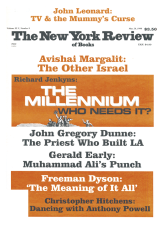In response to:
In the Giving Vein from the April 23, 1998 issue
To the Editors:
In his review of Largesse [NYR, April 23], Sir Ernst Gombrich quotes at length a few lines in which, in commenting on the images of springs and water in the Latin translation of the Bible, I draw attention to the linguistic relationship between unda (the flow), abundantia (abundance), and the verbs abundare (to abound) and superabundare (to overflow), which are frequently used in the biblical texts as metaphors either for the excess of sin or for the gift of Salvation and Grace. As if, among equally gross faults, my underlining that relationship within the biblical text was objectionable and arbitrary, the reviewer remarks: “Such excursions into etymology are sometimes more impressive than convincing, for does not the term ‘redundant’ derive from the same root, a synomym for ‘superfluous’?”
The reviewer’s question deserves an answer. I think it not superfluous, then, to pay attention to the twelve occurrences of redundare in the Latin text of the Bible. In none of these instances does the term mean “to be superfluous” (as suggested by Sir Ernst). The meaning actually is “to be full with,” “to abound,” “to overflow,” “to pour out,” whether it is used to express the excess of evil words (“The mouth of the wicked poureth out evil things,” Proverbs 15:28), or the generosity of wisdom, as in the beautiful Proverbs 18:4: “The words of a man’s mouth are as deep waters, and the wellspring of wisdom as a flowing brook (torrens redundans fons sapientiae).” See the excellent Concordantiarum […] Thesaurus, published at Lethielleux, Paris, 1897.
Far from showing that the verbal relationship I pointed to is not “convincing,” a careful survey of the biblical use of redundare entirely confirms it. According to critical wisdom, etymologically related terms, within a given text, ought to be scrutinized and differentiated with the utmost philological accuracy. “Redundant,” as a matter of fact, is a synonym for “superfluous” in other contexts than the Latin Bible. In general, however, I fully share Sir Ernst’s dislike for punning and far-fetched etymologies, which are, alas, in fashion today in some academic quarters.
The exhibition and the book Largesse (1994) were based, as were the previous ones in the same Parti Pris series, on the collections of the Département des Arts Graphiques du Musée du Louvre, along with the photographic collections of the Musée d’Orsay. The Parti Pris series was conceived not as a set of exhaustive art history monographs written by professional art historians but as an opportunity for writers, artists, and philosophers from different intellectual backgrounds to develop personal views, with large but not unlimited collections at their disposal. Largesse was devoted to a theme in Western literature that had not been clearly perceived and discussed by critics and historians, including your recent reviewer. As a matter of principle, nearly all of the illustrations had to be selected from the drawings belonging to the Louvre Museum. Its collections are magnificent, but, in the case of Largesse, they did not contain material on every aspect of the subject. The scrupulous professional art historian, as well as the common reader, might indeed think of many additional illustrations.
Jean Starobinski
University of Geneva
Switzerland
E.H Gombrich replies:
I am happy to hear that Professor Starobinski shares my distaste for puns and far-fetched etymologies. Where we differ, apparently, is about the relevance to his topic of the etymologies of certain expressions which do not occur in the Hebrew Scriptures, but in the Latin translation which he uses.
I realize that the treasures of the collections he mentions are not inexhaustible, but I still believe that some of the lacunae I pointed out (notably that of the Magi carrying gifts) could easily have been filled many times over.
This Issue
May 28, 1998



